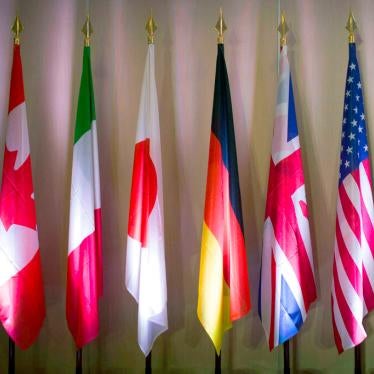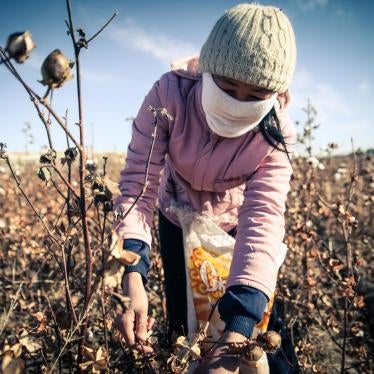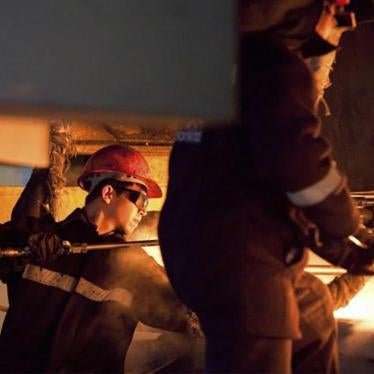The human rights situation in Azerbaijan has deteriorated since the approval of the December 2002 EBRD country strategy. The October 2003 presidential elections, which were carried out in a fraudulent manner and were followed by protests that turned violent, plunged Azerbaijan into a human rights crisis from which it has not recovered. Since then, the government has pressured civil society groups and arbitrarily limited critical expression and political activism with a renewed intensity. The gravity of the situation was reflected in an October 2004 resolution by the Council of Europe’s Parliamentary Assembly, which stated that Azerbaijan’s progress in honoring its obligations and commitments on the functioning of democratic institutions was inadequate.
The Bank’s 2002 country strategy stated that there “are many political parties, including genuine opposition and a growing network of NGOs.” Since that time the atmosphere for civil society has changed significantly. The government crackdown surrounding the 2003 presidential elections dramatically reduced the strength and activity of opposition parties. Security forces reacted to the street protests following the elections with excessive force, brutally beating opposition supporters and journalists. Security forces beat one protester to death. Since then, the authorities have not acknowledged the excessive use of force or indicated that it would hold accountable those responsible for it.
The authorities have also consistently rejected opposition parties’ requests for public demonstrations in Baku. The mass dismissals of opposition supporters from their places of employment and other harassment have left many people fearful and unwilling to show public support for the opposition. The municipal elections in December 2004 provided further indication that the authorities have not rectified the problems leading to electoral abuses. Observers found that there were inaccurate voting lists, tally-sheet falsification, ballot box stuffing and cases of voters being pressured. The Organization for Security and Cooperation in Europe (OSCE) stated that these violations were “serious and could have affected the outcome in the municipalities concerned.”3 Several major opposition parties boycotted the election, complaining of an uneven playing field and intimidation of their proposed candidates.
This deterioration in respect for fundamental human rights in Azerbaijan puts into question the government’s commitments to the principles of democracy and pluralism, as required by Article 1 of the Agreement Establishing the Bank. In its 2002 country strategy, the EBRD stated that “the level and nature of the Bank’s activities will be strongly influenced by the government’s commitment to reform.” We urge the Bank to follow through on this statement of intent by taking concrete steps to achieve it.
Human Rights Watch recommends that the Bank use the upcoming renewal of its country strategy for Azerbaijan as an opportunity to articulate specific benchmarks for improvements in the political and human rights sphere. Following the adoption of its new strategy, the Bank should monitor closely steps taken by the Azerbaijani government toward realizing these goals, and link its level of involvement directly to the government’s progress in meeting them. As we have articulated in previous submissions on other countries, we believe that the use of such benchmarks would significantly enhance the Bank’s potential to promote human rights reforms as part of its engagement. We believe that such an approach would engender a process whereby other actors of the international community and civil society representatives could become more directly engaged in helping to advance progress in the areas identified by the EBRD.
Below we provide a summary overview of our main concerns regarding human rights in Azerbaijan, followed by a proposed set of concrete benchmarks for measuring improvements.
Post-Election Trials
More than one hundred opposition members and supporters were tried on charges relating to the 2003 post-election violence. Only four were released on bail, the rest remained in pre-trial detention for up to approximately six months. Azerbaijani courts convicted all of the defendants, sentencing at least forty-six to custodial sentences ranging from two to six years. The remainder were released on three to five-year suspended prison sentences. On October 22, the Court of Grave Crimes sentenced seven opposition leaders to between two and a half and five years in prison for their role in the post-election violence. According to local observers, prosecution witnesses retracted their testimony in court, claiming that Ministry of Interior officials had tortured and coerced them into signing statements incriminating the defendants. The OSCE raised serious concerns of procedural abuses, including breaches of the right to legal counsel, the right to an impartial and independent tribunal, the right to a fair hearing, the right to a reasoned judgement and the admission of evidence in court that was based on confessions said to have been extracted under torture. Judges’ failure to address these deficiencies reinforced long-standing concerns about the judiciary’s lack of independence. After the OSCE released a report highlighting their concerns, the authorities agreed to increase their cooperation with the OSCE on judicial and legal reform. 4
State Violence
Torture, police abuse, and excessive use of force by the security forces are widespread in Azerbaijan. Peaceful protests have been frequently met with the use of force and arbitrary arrest. Severe beatings at police stations are routine and torture methods in pre-trial detention include electric shock and threats of rape. In 2004, the government failed to show a commitment to deal with these problems, perpetuating an environment of almost total impunity for security force abuses surrounding the October 2003 presidential elections. Although international interlocutors repeatedly called on the government to investigate allegations that the Organized Crime Unit of the Ministry of Interior tortured detainees and that the security forces used excessive violence during the protests following the elections, at the time of writing the authorities had not prosecuted any cases.
Political Prisoners
Azerbaijan is making some progress toward releasing or retrying political prisoners, a long-standing problem. By July 2004, following several amnesties in late 2003 and early 2004, the government had released thirty-two political prisoners and agreed to retry eleven, from a Council of Europe list of forty-five. However, the Council of Europe and local groups maintained that additional political prisoners remain in custody, and that the recent imprisonment of opposition supporters, accused of involvement in the post-election violence, added to their ranks. The chance of a fair trial for political prisoners facing retrial remains slim because of the lack of an independent judiciary. The Council of Europe previously condemned retrials of political prisoners as a “sham” controlled by the presidential authorities rather than the judiciary.
Civil Society Organizations
The government attempts to tightly control civil society and pressures and harasses groups that are critical of government policies. In a dramatic example of this tendency, the authorities tried Ilgar Ibrahimoglu, the head of the Center for the Protection of Conscience and Religious Freedom, and government critic, for alleged participation in the post-election violence. In April, a Baku court found him guilty and handed him a five-year suspended prison sentence, despite serious allegations that the charges were falsified. While Ibrahimoglu was in custody, a court ordered the eviction of the Juma Mosque community, which Ibrahimoglu headed, from the mosque it had used since 1992. In June, police forcefully evicted worshippers from the mosque, detaining several of them. On July 30, police prevented the community from meeting at a private house, raiding the premises and temporarily detaining all twenty-six members present.
The Azerbaijani authorities use onerous registration procedures to arbitrarily deny registration to independent nongovernmental organizations (NGOs). For example, in September the Ministry of Justice rejected the application for registration of the Azerbaijan Foundation of Democracy Development and Human Rights Protection, on technical grounds that the organization says are not specified in the law on NGOs. The Azerbaijan Foundation of Democracy Development and Human Rights Protection also applied for registration in 2000, but received no answer from the Ministry.
Media Freedom5
Authorities use a variety of informal measures to prevent or limit news critical of the government from reaching the public. Major television outlets are either state-owned or affiliated, and the government fully controls the issuing of radio and television broadcast licenses through a licensing board that consisted entirely of presidential appointees. The opposition and independent media are under constant pressure, including through limited access to printing presses and distribution networks, crippling fines from government- instituted defamation cases, and harassment of journalists. In 2004, Hurriet, an opposition newspaper affiliated with the Azerbaijan Democratic Party, had to suspend publishing due to financial burdens and government harassment leading to difficulties distributing and selling the newspaper outside of Baku. Yeni Musavat, an opposition daily affiliated with the Musavat Party, was similarly forced to suspend publishing briefly in December 2004 and again in January 2005.
In addition, journalists and editors are subjected to physical assaults and intimidation. For example, at the end of July, an unknown assailant attacked a journalist for Monitor, an independent weekly magazine. On December 29, police reportedly beat Alim Kazimov, a journalist for Yeni Musavat, in the Narimanov district police station in Baku when he came to renew his identification card. He reportedly lost consciousness and had to be hospitalized for head injuries. Police denied the beating, claiming that Kazimov began to feel ill in the police station and then lost consciousness. A police officer was reprimanded in relation to this incident. In another case, Akper Hasanov, a journalist for Monitor, reported that on February 2, 2005 several men forced him into the Baku military headquarters where they held him for almost five hours and forced him to write a retraction of a January article he wrote about poor conditions in a military unit. The Defense Ministry denied the allegations, stating that Hasanov was called to the military headquarters, where he admitted falsifying the facts in the article. According to Turan Information Agency, the Defense Ministry made Hasanov's statement public the next day. At the time of writing no one had been prosecuted for these incidents.
Benchmarks
Election Related
• Pledge publicly that future elections will meet OSCE commitments and other international standards, and take concrete steps to convey the sincerity and gravity of this message, including by acting on the detailed recommendations of the OSCE Office for Democratic Institutions and Human Rights following the October 2003 presidential election.
• Regarding those convicted for involvement in the 2003 post-election violence, cancel the sentences imposed that resulted from trials that fell substantially short of Azerbaijan's international commitments and obligations to fair trials. Release or retry persons convicted in such trials, as recommended by the OSCE in the Report from the Trial Monitoring Project in Azerbaijan 2003-2004;
• Ensure a thorough and impartial investigation of torture and ill-treatment of people detained following the post-election events and prosecute those found responsible;
• Ensure a thorough and impartial investigation into the use of excessive force during the protests following the elections and prosecute those found responsible;
• Offer full reinstatement to persons who lost employment as punishment for involvement with opposition political parties around the time of the October 2003 elections, or subsquently.
Freedom of Expression and Assembly
• Ensure a thorough and impartial investigation of all attacks on journalists and prosecute those found responsible;
• Repeal criminal insult and libel provisions from the criminal code;
• Amend the civil code to establish a reasonable statutory cap on civil awards for non-pecuniary damages;
• Ensure that government authorities facilitate, rather than block, the right to freedom of assembly, in particular by granting those affiliated with opposition parties permission to carry out peaceful public protests and by ensuring their safety at such gatherings.
Torture
• Thoroughly and impartially investigate all allegations of ill-treatment or torture and prosecute the perpetrators.
Transparency and Access
• Issue standing invitations to all U.N. special mechanisms to visit Azerbaijan, including the Working Group on Arbitrary Detention, the Special Rapporteur on Torture, the Special Rapporteur on Freedom of Opinion and Expression, the Special Rapporteur on Freedom of Religion or Belief, the Special Representative on Human Rights Defenders, the Special Rapporteur on the Independence of Judges and Lawyers, and the Representative of the Secretary-General on Internally Displaced Persons.
• Stop arbitrary rejections of registration applications to NGOs and process applications in accordance with the law.
[1]See “Crushing Dissent: Repression, Violence and Azerbaijan’s Elections,” Human Rights Watch report, January 2004, and Organization for Security and Cooperation in Europe Office for Democratic Institutions and Human Rights, Republic of Azerbaijan Presidential Elections 15 October 2003, Final Report.
[2]Resolution 1398 (2004), October 5, 2004, Parliamentary Assembly of the Council of Europe.
[3]“Low polling and some problems accompany Azerbaijan’s municipal election,” Statement by the OSCE Baku office, December 17, 2004, [online] http://www.osce.org/news/show_news.php?id=4624 (retrieved February 7, 2004).
[4]“OSCE and Azerbaijani authorities agree on co-operation following report on trial monitoring,” OSCE press release, February 4, 2005, [online] http://www.osce.org/news/generate.php3?news_id=4691 (retrieved February 9, 2005).
[5]For more detail on media freedom in Azerbaijan, see “Azerbaijan: Media, the Presidential Elections and the Aftermath,” Human Rights Watch briefing paper, August 4, 2004.







